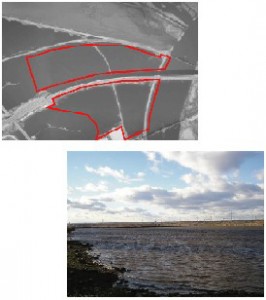Category: Candidate Restoration/Preservation Site 
Location: The site is divided horizontally by the New Jersey Turnpike – Eastern Spur and bordered in the east by the Hackensack River in Kearny, Hudson County.
Latitude/Longitude: 40.75814/-74.10272
Current Land Use: Tidal marsh
Size: 116 acres
Current Ownership: NJMC
Site Description: Emergent vegetation at the Kearny Brackish Marsh has been mostly eliminated over the past ten years and replaced by open water. Both tidal flows and hydrologic connections have been restricted due to surrounding development. The current conceptual restoration design includes the re-establishment of emergent vegetation by managing water levels and preventing soil erosion, potentially through the replacement of the broken water control structures at the Cayuga Dike.
Existing Site-Specific Data Inventory
A. Survey, Maps, and GIS
HMD regional data exists inclusive of this site.
B. Real Estate/Ownership
Owned by NJMC. Acquisition data available on NJMC website.
C. Site History & Land Use
No data obtained.
D. Biological Studies – Fauna
No data obtained.
E. Biological Studies – General Environmental
A sediment/vegetation comparative study was performed in 2003. Wetland assessment was performed in 2003.
F. Geotechnical
No data obtained.
G. Hydraulics and Hydrology
No data obtained.
H. Water and Sediments
A sediment/vegetation comparative study was performed in 2003.
I. Historical/Cultural Resources
No data obtained.
J. Restoration/Remediation Design Plans
No data obtained.
Site Reports
Site #15 – Kearny Brackish Marsh
Category: Candidate Restoration/Preservation Site
Location: The site is divided horizontally by the New Jersey Turnpike – Eastern Spur and bordered in the east by the Hackensack River in Kearny, Hudson County.
Latitude/Longitude: 40.75814 / -74.10272
Current Land Use: Tidal marsh
Size: 116 acres
Current Ownership: NJMC
Site Description: Emergent vegetation at the Kearny Brackish Marsh has been mostly eliminated over the past ten years and replaced by open water. Both tidal flows and hydrologic connections have been restricted due to surrounding development. The current conceptual restoration design includes the re-establishment of emergent vegetation by managing water levels and preventing soil erosion, potentially through the replacement of the broken water control structures at the Cayuga Dike.
Existing Site Specific Data Inventory
* – Report repeated under multiple data categories and/or sites.
A. Survey, Maps, and GIS
Relevant survey, mapping, and GIS data for the Meadowlands can be found in the Meadowlands-wide site report under data category A.
B. Real Estate/Ownership
Kearny Brackish Marsh is owned by NJMC.
1. NJMC. Kearny Brackish Marsh Acquisition Information. September 2003.
Date of Acquisition: November 9, 1999
Cost of Acquisition: $933,085
Acquired from: Town of Kearny
C. Site History & Land Use
No data obtained.
D. Biological Studies – Fauna
No data obtained.
E. Biological Studies – General Environmental
2. *The Louis Berger Group, Inc. Hydrogeomorphic (HGM) Functional Assessment Model and Guidebook for Tidal Fringe Wetlands in the New Jersey Meadowlands. 2003. [1a](http://merilibrary.meadowlands.state.nj.us/dbtw-wpd/FullText/HGM_guidebook_RVSD.pdf) A hydrogeomorphic functional assessment model and guidebook for tidal fringe wetlands in the Hackensack Meadowlands was completed. The HGM model can be used as a tool to help determine wetland functions and values and to approximate compensatory wetland mitigation. Map-based and on-site field data (including amount of aquatic edge, channel density, vegetative cover, habitat, soil texture, and tidal inundation) were collected from the reference wetlands and used to refine data collection forms, calibrate model variables, and improve the conceptual HGM functional models. Reference sites included Skeetkill Creek Marsh, Meadowlark Marsh, Lyndhurst Riverside Marsh, MRI, Western Brackish Marsh, Mill Creek Marsh, Eastern Brackish Marsh, Mori Tract, Walden Marsh, Oritani Marsh, Harrier Meadow, Anderson Creek Marsh, Kearny Brackish Marsh, and Riverbend Wetlands Preserve.
3. *Ravit, B., J.G. Ehrenfeld, & M.M. Haggblom. A Comparison of Sediment Microbial Communities Associated with Phragmites australis and Spartina alterniflora in Brackish Wetlands of New Jersey. Estuaries. 26(2B). 2003. [1a]Sediment samples under different vegetation types were collected at Kearny Brackish Marsh and Mill Creek Wetland Mitigation Site. Microbial communities within the sediments are being examined to determine if there are any correlations or differences among microbial community, contaminant levels, and type of overlying vegetation in brackish marsh areas.
F. Geotechnical
No data obtained.
G. Hydraulics and Hydrology
No data obtained.
H. Water and Sediments
4. *Ravit, B., J.G. Ehrenfeld, & M.M. Haggblom. A Comparison of Sediment Microbial Communities Associated with Phragmites australis and Spartina alterniflora in Brackish Wetlands of New Jersey. Estuaries. 26(2B). 2003. [1a]Sediment samples under different vegetation types were collected at Kearny Brackish Marsh and Mill Creek Wetland Mitigation Site. Microbial communities within the sediments are being examined to determine if there are any correlations or differences among microbial community, contaminant levels, and type of overlying vegetation in brackish marsh areas.
I. Historical/Cultural Resources
No data obtained.
J. Restoration/Remediation Design Plans
No data obtained.
K. Bibliographic Updates
Site #15: Kearny Brackish Marsh
